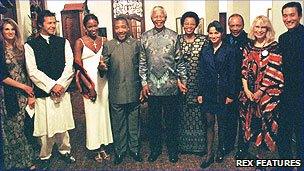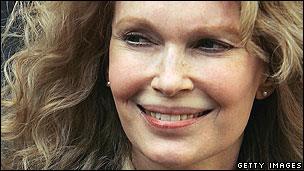The supermodel, the president, the actress and the warlord
- Published
Campbell: 'I saw a few dirty looking stones in the pouch'
Her life is far from normal, but even by her own standards Naomi Campbell's appearance at the war crimes trial of former Liberia President Charles Taylor is bizarre. So how did it come about?
It has been running for over three years, but only recently has the trial of Charles Taylor been grabbing the headlines outside of Africa. The reason? Supermodel Naomi Campbell.
She appeared at the war crimes trial at The Hague on Thursday over claims she was given so-called "blood diamonds" by Mr Taylor. She previously denied the allegation, but has now admitted she was given two or three "dirty-looking stones" in a pouch which she was later told were likely to be diamonds. The former president denies the claim, dismissing all the 11 charges against him, which include murder, rape and turning children into soldiers.
Her evidence could be crucial because Mr Taylor is accused of funding years of atrocities in the civil war in neighbouring Sierra Leone and arming rebels from the Revolutionary United Front (RUF) in return for "blood diamonds". He denies this. The prosecution argued that Miss Campbell's testimony could directly tie Mr Taylor to the trade in diamonds for arms.
"It [the trade in conflict diamonds] was a major problem during the time of the civil war and the time Campbell received her diamond," says David Crane, a law professor at Syracuse University College in the US and founding chief prosecutor of an international war crimes tribunal for Sierra Leone.
It was a dinner date 13 years ago that has resulted in Miss Campbell finding herself centre stage at the trial. With a world-famous supermodel in attendance, it was no ordinary dinner to start with.
The gathering on 26 September 1997, in Cape Town, was hosted by South Africa's then president, Nelson Mandela, at his home. It was a star-studded event, with other guests including Jemima and Imran Khan, music producer Quincy Jones, actress Mia Farrow and Charles Taylor, who had just been newly elected.
Miss Campbell had become close to the former South African leader - who she refers to as her "honorary grandfather'' - with their friendship reportedly going back to 1991.
'Unforgettable story'
The guests had all been personally invited by Mr Mandela to mark the inaugural journey of South Africa's newly renovated equivalent of the Orient Express, called the Blue Train. It had undergone a multi-million pound make-over, with Mr Mandela and his guests among the first passengers.
The event was also in aid of his children's charity, a cause Miss Campbell was already heavily involved with. At the time the model was developing a role as a charity campaigner; in recent years she has raised money for Aids charities and the victims of the Haiti earthquake.
The group had taken a trip aboard the train from Pretoria to Cape Town the previous day. But it was the dinner at Mr Mandela's house that is of interest to prosecutors. In a now well-publicised picture, Miss Campbell and Mr Taylor are seen standing next to each other before going in to dine. It is claimed they were also seated next to each other at the meal, but the supermodel has denied this.
Sitting opposite was Mia Farrow - the Hollywood actress turned charity campaigner who was in South Africa at the time with some of her children - while Miss Campbell's former agent, Carole White, was nearby. Both are due to give evidence at The Hague next week about the night in question.
Ms White has said in a written statement to the court that talk over the meal turned to diamonds and she "personally heard Mr Taylor say that he wanted to give diamonds to Ms Campbell". Something the model denies.
After the meal however, when guests returned to their rooms, Campbell now says she was sleeping when there was a knock at the door.
"Two men were there and gave me a pouch and said: 'A gift for you'," she told the trial.
The men did not introduce themselves. She says she put the pouch next to her bed without looking inside it, and went back to sleep.
Media frenzy
Ms Farrow, who won a Golden Globe acting award for Rosemary's Baby in 1968, says Miss Campbell told her about the incident the following day at breakfast, something the model has now confirmed. In a written statement to the court, the actress says: "The next morning when the other guests, my children and I met for breakfast, Naomi Campbell was there and had an unforgettable story.
"She told us she had been awakened in the night by knocking at her door. She opened the door to find two or three men - I do not recall how many - who presented her with a large diamond which they said was from Charles Taylor."

Mandela with Taylor and Campbell (directly to his right) before the meal
There is some dispute over the number of diamonds she was allegedly given. While Ms Farrow says it was one, Ms White said in a recent newspaper interview that it was six. "They weren't cut. They were in a bit of paper. I saw them. I had them in my hand," she is quoted as saying in the Daily Mail. Campbell says it was "two or three".
The model says she gave the stones to Jeremy Ractliffe of the Nelson Mandela children's fund, telling him to do "some good" with them. But the fund says it has "never received a diamond or diamonds from Ms Campbell or from anyone else" and it would have been "improper and illegal to have done so".
The fateful night was not publicly mentioned for years by anyone who had been there. It was only when Ms Farrow became aware of Mr Taylor's trial last year that she contacted the court. She then spoken publicly about the night in question to US media and the international press jumped on the story.
'International interest'
"Naomi Campbell only entered this bigger picture fairly late in the day," says Jon Silverman, professor in Media and Criminal Justice at the University of Bedfordshire. He is attending the trial as part of a BBC project to provide daily radio reports to audiences in Liberia and Sierra Leone.
"It was Farrow who disclosed that she had been told by Campbell that, during the night, three men purporting to be acting on Taylor's behalf, presented her with a large uncut diamond as a gift."
Previously Miss Campbell denied the claims. "I didn't receive a diamond and I'm not going to speak about that, thank you very much," she told a journalist from ABC News earlier this year.
A few weeks later, she told talk show host Oprah Winfrey: "I don't want to be involved in this man's case - he has done some terrible things and I don't want to put my family in danger."

Actress Mia Farrow sparked interest in what happened that night
She was, however, subpoenaed - forcing her to appear. It sparked a media frenzy and interest in the trial went "off the scale", says Prof Silverman.
"Ten satellite trucks have been registered to broadcast the proceedings live and there is literally no more available space outside the building," he says. "Demand for space in the media centre has outstripped the number of spaces and feed points."
A spokesman for the court said more than 200 journalists from around the world had sought accreditation for Thursday's hearing. Only 40 seats are available in the public gallery of the courtroom and 36 in the media centre.
Campaigners say the publicity created by Miss Campbell's appearance can be used to highlight the issue of conflict diamonds.
"Whilst it's sad that it takes the involvement of a supermodel to get people talking about the issue of blood diamonds again, the international interest generated by this episode has thrown a welcome spotlight back on the issue," says Elly Harrowell, from Global Witness, a pressure group that campaigns to prevent natural resource-related conflict and corruption.